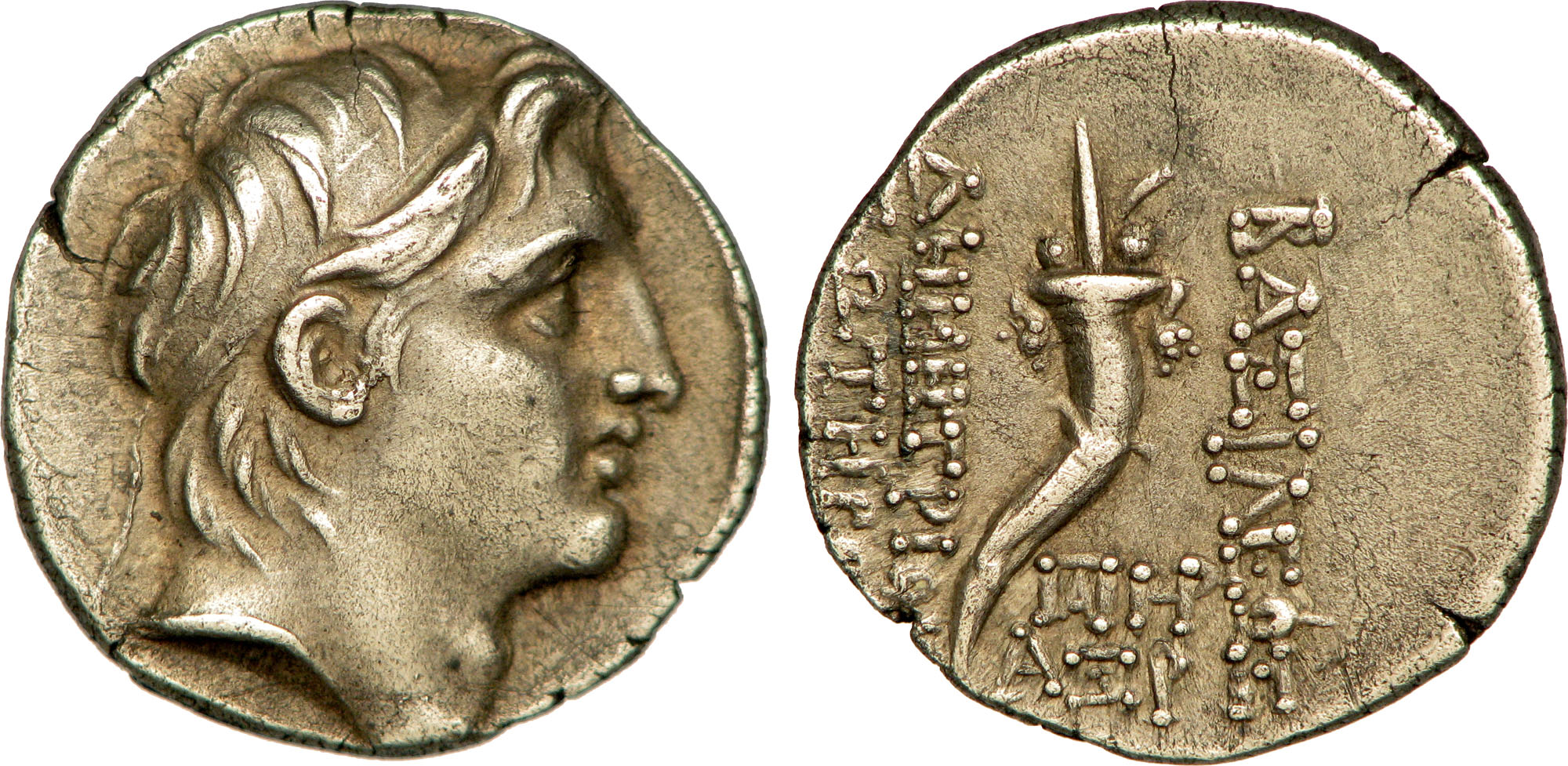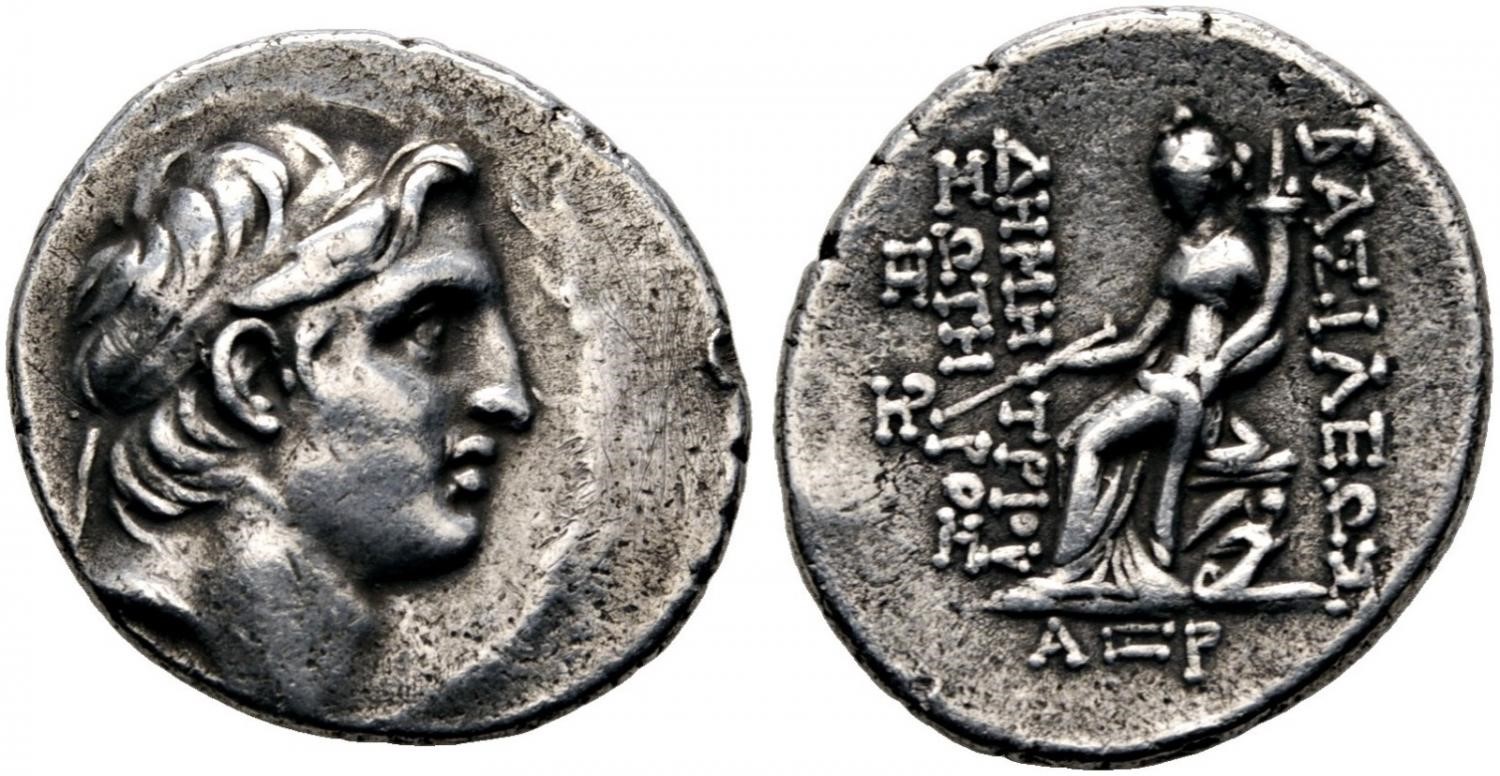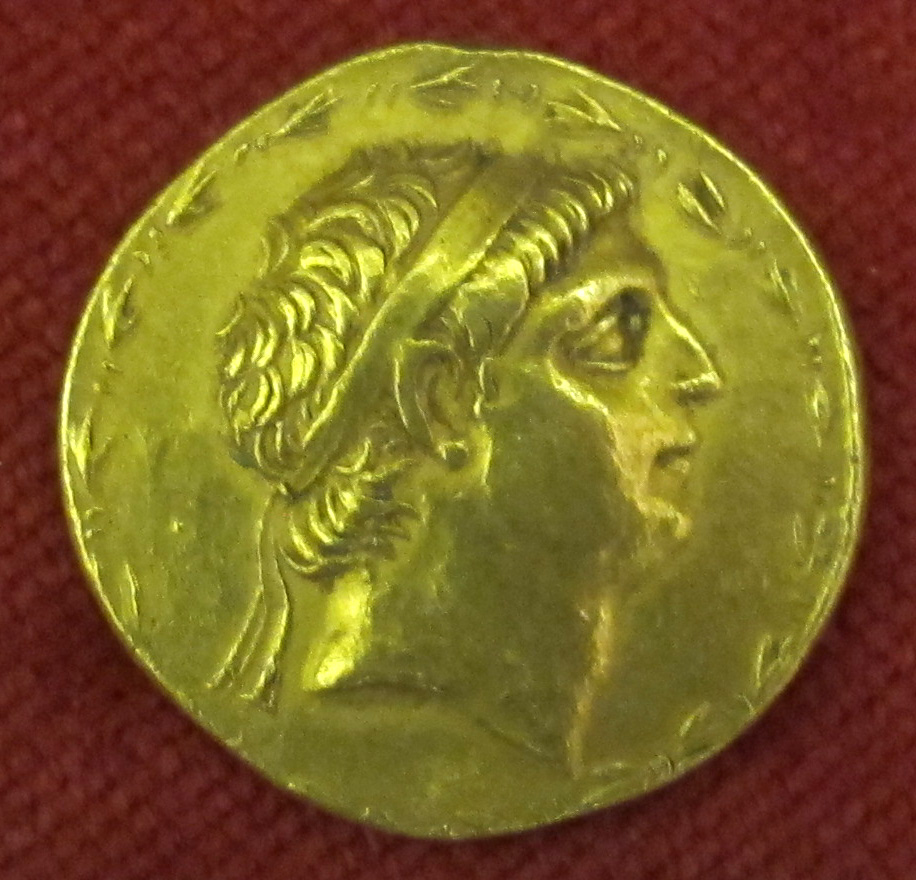1. Overview
Demetrius I Soter (Δημήτριος Α` ὁ ΣωτήρDēmḗtrios ho SōtḗrGreek, Ancient, "Demetrius the Saviour"; c. 185 BCE - June 150 BCE) was a Hellenistic king who ruled the Seleucid Empire from November 162 BCE to June 150 BCE. He was the son of Seleucus IV Philopator and Laodice IV. Sent to Rome as a political hostage in his youth, Demetrius eventually escaped confinement and returned to Greek Syria to claim his rightful throne. He overthrew his young cousin Antiochus V Eupator and his regent Lysias.
Demetrius's reign was characterized by continuous efforts to consolidate power and suppress various internal and external challenges to his authority. He faced significant revolts from figures like Timarchus and Alexander Balas. His suppression of these uprisings, particularly against Timarchus, earned him the title "Soter," meaning "Savior," from the Babylonians. He also played a key role in attempting to suppress the Maccabean Revolt in Judea, defeating Judas Maccabaeus. Despite his successes, Roman support for pretenders ultimately led to his downfall and death in a civil war against Alexander Balas.
2. Biography
Demetrius I Soter's life was marked by early political captivity, a dramatic escape, and a determined struggle to reclaim and maintain his family's throne amidst regional instability and Roman interference.
2.1. Early Life and Hostage Period in Rome
Demetrius was born around 185 BCE, the third son of Seleucus IV Philopator, then king of the Seleucid Empire, and his wife Laodice IV. As part of the terms stipulated in the Treaty of Apamea, which concluded the Roman-Seleucid War, Rome required prominent members of the Seleucid royal family to be sent as hostages to ensure compliance. Demetrius was sent to Rome at a young age, fulfilling this requirement during his father's reign.
In 175 BCE, Demetrius's father, Seleucus IV, was likely murdered by his finance minister, Heliodorus. Demetrius's uncle, Antiochus IV Epiphanes, took advantage of the situation by overthrowing Heliodorus and seizing the throne for himself. Although Demetrius was the legitimate heir, he was unable to claim his birthright because he was still held captive in Rome and considered too young to rule.
Antiochus IV died around October-November 164 BCE (or 163 BCE according to some sources) while on a military campaign in Babylonia and Persia. His nine-year-old son, Antiochus V Eupator, succeeded him as king, with real power residing in the hands of Lysias, whom Antiochus IV had appointed as regent in Antioch. At this time, Demetrius was approximately 22 years old. He petitioned the Roman Senate to restore the Syrian throne to him, arguing for his rightful claim. However, his request was rejected, as the Romans strategically preferred a weakened Syria ruled by a young, inexperienced boy rather than a mature, potentially strong monarch like Demetrius.
Two years later, Antiochus V's authority was further undermined when Rome dispatched an emissary to enforce the Treaty of Apamea, ordering the sinking of Seleucid ships and the hampering of their war elephants, citing excessive military preparations. Demetrius again appealed to the Senate, contending that his continued captivity would not compel Antiochus V to respect Roman authority. This plea was also unsuccessful, as Rome persisted in its preference for the perceived weakness of the child king over Demetrius.
With the crucial assistance of the Greek historian Polybius, who was also in Rome and served as an advisor to Demetrius, Demetrius successfully escaped from his Roman confinement. He made his way back to the Seleucid capital, Antioch. His journey and return were unusually well-documented, largely due to Polybius's firsthand account in The Histories. Upon his arrival, Demetrius quickly garnered the support of the local aristocracy, who welcomed him back.
2.2. Accession to the Throne
In November 162 BCE (or 161 BCE by some reckonings), Demetrius successfully reclaimed the Syrian throne. Immediately upon his ascension, he ordered the execution of both Antiochus V and his regent Lysias, thereby eliminating direct threats to his rule and signaling a decisive return to a strong, adult monarchy for the Seleucid Empire.
3. Reign and Major Achievements
Demetrius I's reign was marked by significant efforts to stabilize and reunify the Seleucid Empire, earning him recognition for his military prowess and administrative capabilities.
3.1. Consolidation of Power and Suppression of Revolts
Upon Demetrius's accession, the Romans did not actively support his rule, instead offering indirect encouragement and support to various factions seeking to fragment and thus weaken the Seleucid Empire. This strategy aimed to prevent the emergence of a strong, unified Seleucid state that could challenge Roman interests. Among those who received Roman backing were the satrap Timarchus, the Jewish Maccabees, Ptolemaeus of Commagene, and Artaxias I of Armenia.
Demetrius dedicated much of his reign to suppressing these internal rebellions and challenges to his authority. A notable threat came from Timarchus, the Median satrap, who had distinguished himself in defending Media against the rising power of the Parthians. Timarchus saw Demetrius's ascension as an opportunity to declare himself an independent king, extending his realm into Babylonia and ruling tyrannically. Demetrius, however, swiftly moved to confront this challenge. In 160 BCE, Demetrius engaged Timarchus's forces, defeated him, and killed him, liberating the Babylonians from his oppressive rule. This victory temporarily unified the Seleucid Empire once more. Following this success, Demetrius also dethroned Ariarathes V, the king of Cappadocia, further consolidating his control over the region.
3.2. Suppression of the Maccabean Revolt
In Judea, Demetrius I implemented stringent measures to quell the ongoing Maccabean Revolt, a conflict that is extensively documented in the Books of the Maccabees. Shortly after beginning his reign, Demetrius dispatched a new High Priest, Alcimus, to Judea. Alcimus managed to persuade a segment of the Jewish population to acknowledge and adhere to the Seleucid government.
Demetrius further reinforced his efforts by sending a military expedition under the command of Bacchides. Bacchides's forces effectively curtailed Maccabean influence over many Judean cities. The conflict culminated in the Battle of Elasa in 160 BCE, where Bacchides and his army decisively defeated and killed the prominent rebel leader, Judas Maccabaeus. This victory momentarily restored Seleucid control over the province for several years, though the underlying tensions remained.
3.3. Acquisition of the Title 'Soter'
Demetrius's decisive victory over the rebellious Median satrap Timarchus in Babylonia earned him the esteemed surname Soter (ΣωτήρSōtḗrGreek, Ancient), meaning "Savior." This title was bestowed upon him by the grateful Babylonians, whom he had liberated from Timarchus's despotic rule. The acquisition of this title underscored Demetrius's successful consolidation of royal authority and his ability to restore order and stability within the empire after a period of fragmentation and rebellion. It served as a significant validation of his legitimacy and effectiveness as a ruler.
3.4. Family and Succession
Demetrius I may have married his sister, Laodice V, a practice not uncommon in Hellenistic royal families. Together, they had three sons: Demetrius II Nicator, Antiochus VII Sidetes, and Antigonus. These sons played significant roles in the subsequent history of the Seleucid Empire, with Demetrius II and Antiochus VII both eventually ascending to the throne, continuing the dynastic line despite the turbulent political landscape.
4. Downfall and Death

Demetrius I's downfall was largely orchestrated by Heracleides, the surviving brother of the defeated rebel Timarchus. Heracleides championed the cause of Alexander Balas, a young man who claimed to be a natural son of the late Antiochus IV Epiphanes. Heracleides successfully convinced the Roman Senate to support this young pretender against Demetrius I, as Rome continued its policy of undermining the Seleucid Empire through internal division.
Alexander Balas, with his mercenary army and Roman backing, landed and occupied Ptolemais. He proclaimed himself king of the Seleucids in the Seleucid year 160 (153 BCE-152 BCE), igniting a civil war within the empire, which now found itself with two rival kings.
While the Jews constituted a relatively minor part of Demetrius I's vast empire, their narrative of this period is unusually well-preserved, particularly in the Books of the Maccabees. Jonathan Apphus, the brother and successor of Judas Maccabaeus as the leader of the Maccabees, initially managed to negotiate a temporary truce with Demetrius I. This arrangement allowed Demetrius to withdraw some Seleucid forces from Judea to deploy them against Alexander Balas.
However, Jonathan swiftly abandoned this truce when Alexander Balas offered a significantly more advantageous deal. Balas forged an alliance with Jonathan, appointing him as High Priest of Judea and strategos (military commander), in exchange for Jewish troops to support Balas's cause. Jonathan, though from a priestly family, was not of the High Priestly lineage of Zadok, yet he assumed the title in Tishri, 152 BCE. When Demetrius learned of this development, he promptly sent a letter to Jonathan, offering even greater privileges in an attempt to win back his allegiance. However, Jonathan did not accept Demetrius's offer, likely due to a combination of trust in Balas, deep distrust in Demetrius (especially given Demetrius's past persecutions of the Jews), and a belief that Balas was more likely to win the ongoing civil war.


The civil war escalated, and ultimately, Alexander Balas defeated and killed Demetrius I in 150 BCE. With Demetrius's death, Alexander Balas became the sole king of Syria, though his reign would also prove to be tumultuous and short-lived.
5. Legacy
Demetrius I Soter's reign, though ultimately ending in defeat, represented a significant attempt to restore stability and unity to the fragmented Seleucid Empire. His military successes against internal rebels like Timarchus and his efforts to suppress the Maccabean Revolt demonstrated his resolve and earned him the title of "Savior" from the Babylonians. His struggle against Roman interference and the pretenders they supported highlights the precarious position of the Seleucid monarchy in the Hellenistic period.
The Greek poet Constantine Cavafy published a poem in 1919 about Demetrius's time as a hostage in Rome, reflecting on his early life and the political circumstances that shaped his destiny. Demetrius I's story serves as a poignant example of the challenges faced by Hellenistic rulers in maintaining their authority against both internal dissension and the pervasive influence of rising powers like Rome.